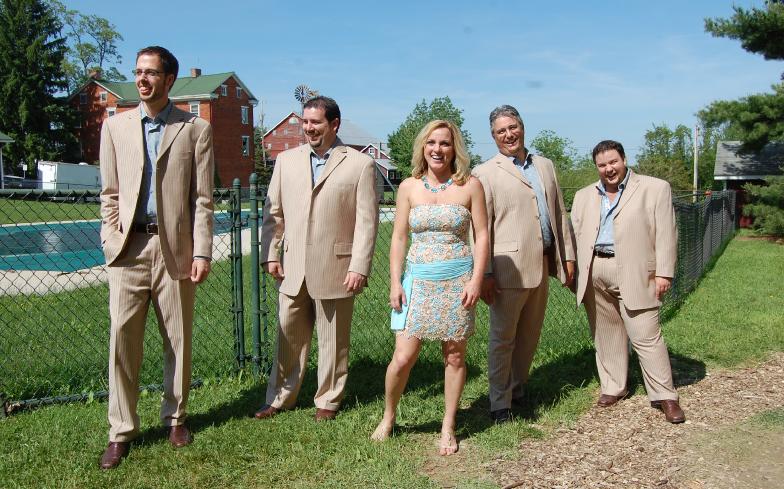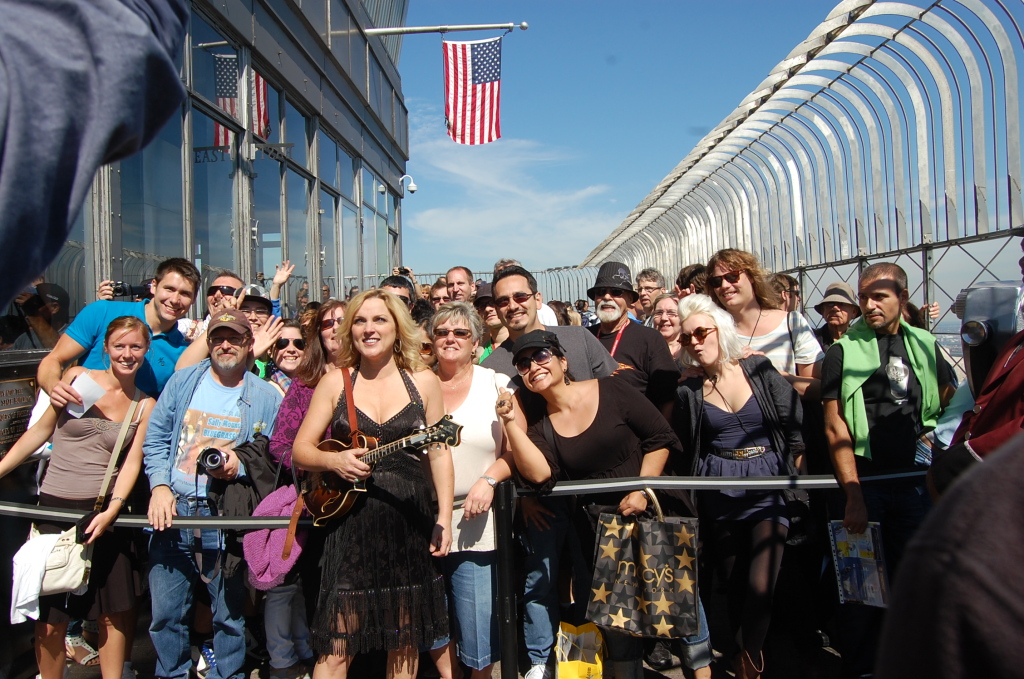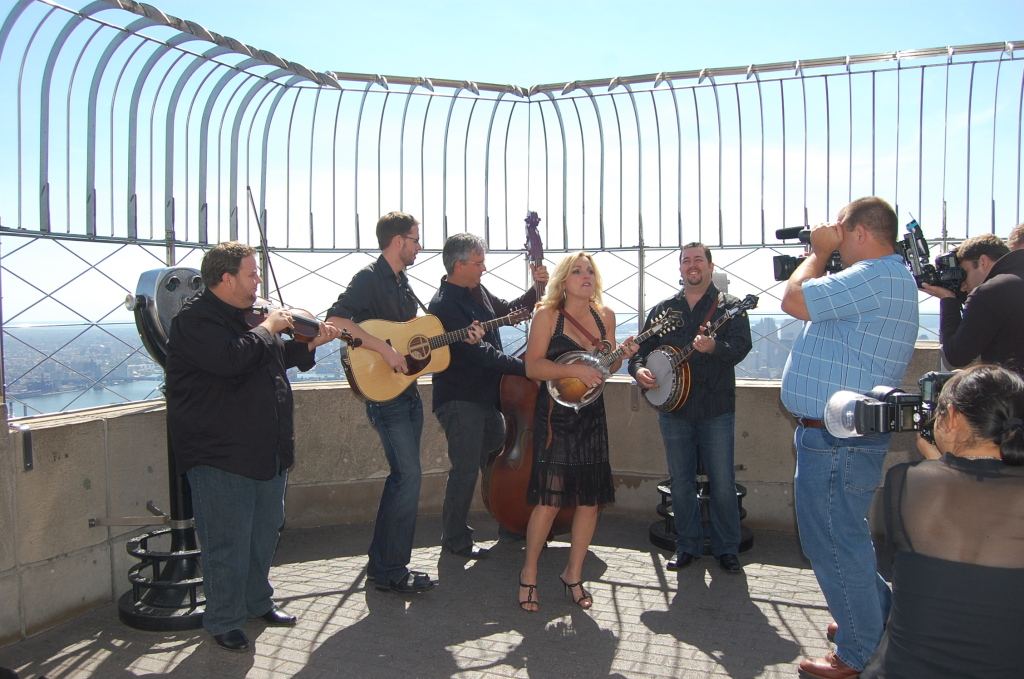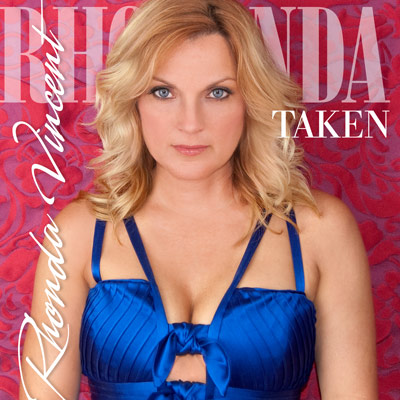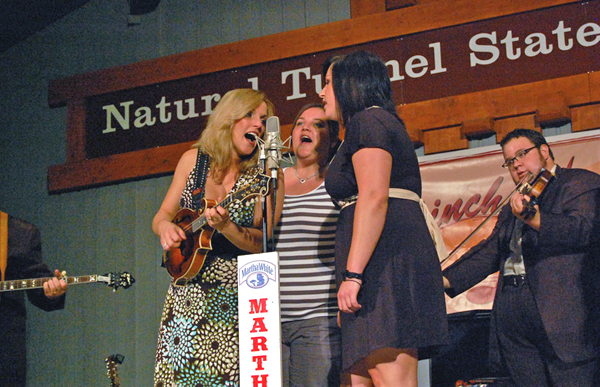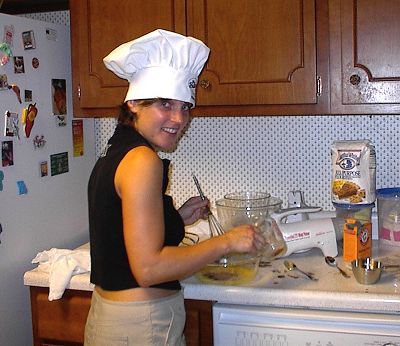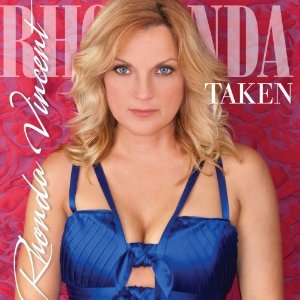When her bus driver had an accident in the Lincoln Tunnel, Rhonda Vincent and The Rage had no choice but to dress down for their show at Joe’s Pub on September 24. A different set of circumstance prevailed on September 9, when she and the band played a private event on a farm near Gettysburg, PA, and Rhonda took a John Deere 9760 STS combine out for a test drive. (Photo from The Bluegrass Blog, John Lawless)‘Organized Chaos’ In Human Form
Taking full control of her career, Queen of Bluegrass Rhonda Vincent starts her own label, takes a powerful new album on the road, and rolls with the flow. Everybody Loves Raymond figures into the mix too.
By David McGeeNow this is different.
It’s September 24 at Joe’s Pub in Manhattan, Rhonda Vincent and her band The Rage are in town for CD release events centered on her new CD, Taken, and…they’re late.
Joe’s Pub is one of those places where the published starting time does not mean, in rock ‘n’ roll parlance, actually a half hour or more later. At Joe’s Pub, 7:30 p.m. is really 7:30 p.m, in deference to the one or two other featured groups or artists booked for the same night. So when the clock ticked past the announced starting time, some patrons began looking around, a bit puzzled. Is this or is this not Joe’s Pub?
Yes, it is Joe’s, and at some point not too distant from 7:30 p.m. the members of The Rage emerged through the backstage curtain. Lo, they were not clad in their usual Sunday best, but rather in cargo shorts and polo shirts; for God’s sake, the fiddler extraordinaire Hunter Berry (now Rhonda’s son-in-law in addition to being a multiple SPBGMA Fiddle Player of the Year award winner) is even wearing a baseball cap with sunglasses perched on its bill.
Not to worry—Rhonda will be dressed to the nines, we know beyond all doubt.
But lo, when she emerges, she's sporting a casual black, off the shoulder top and a fringed skirt with alternating black and white stripes.
“Our bus driver had an accident in the Lincoln Tunnel,” she explains to the packed house, “and he’s got all our clothes and all our instruments. We had to borrow instruments from the next band, but we still don’t have a mandolin. So if anyone has a mandolin they can loan us…”
Indeed, bass player Mickey Harris is, for the first time ever in a Rhonda Vincent, Queen of Bluegrass, show, playing an electric instrument.
Rhonda and The Rage, typically spiffy: (from left) Ben Helson, Aaron McDarris, Rhonda, Mickey Harris, Hunter Berry.Yet, despite the very weird apparition of a Rage member gone electric, Vincent and company did not, as the saying goes, miss a beat. You wouldn’t know the banjo master Aaron McDarris wasn’t playing his own instrument from the sprightly soloing he engaged in throughout “Sweet Summertime,” a gently rolling seasonal reminiscence centered on family and youthful frolics, penned by Donna Webster and featuring a stirring high lonesome chorus beautifully harmonized by the assembled multitude. Dolly Parton wasn’t on hand to sing her harmony parts on the dramatic murder ballad “In the Garden By the Fountain,” but her absence was more than made up for by the intensity of Vincent’s delivery of the lyric in which the female character kills and buries the lover who’s lost interest in her in the very spot where they shared some of their most tender moments. If Hunter Berry wasn’t at home on his borrowed fiddle, he didn’t give away any sense of discomfort when lighting into the buoyant parts fueling Vincent’s warm rendering of Ronnie Milsap’s classic “Back On My Mind,” in an arrangement that also gave the young guitarist Ben Helson a tasty solo spot as well.
Eventually, a gent came out of the audience bearing a mandolin—“it’s my daughter’s,” he told Rhonda—and even later the bus driver finally arrived. Not only did he come bearing instruments, but he also stopped by the bar and ordered up tall glasses of iced Coke for the players. Most critically, he brought Rhonda’s stage dress, a fringed black number made especially for her by a local designer. While the band played an instrumental, she retired backstage and returned a few minutes later appreciably flashier in appearance, and with her own mandolin in tow. The set was almost over—Joe’s Pub’s clock was ticking on—but the musicians picked up the pace and the intensity. McDarris tore off a hot banjo solo and suddenly the band was sprinting through a rousing take on Poco’s classic “Crazy Love,” last heard on Vincent’s 2009 album, Destination Life, and here featuring not only a wonderfully heartfelt vocal by Rhonda but also her own lightning quick mandolin solo and a fleeting response to it from Helson before McDarris’s ever rolling banjo took it home. When the set was over, even Joe’s could not deny the band the encore the audience was insisting on.
‘Crazy Love’: Rhonda Vincent performs the Poco classic liveBut there was more. At one point during the set, in explaining the current status of the driver and the bus, Vincent told the audience that everyone in the audience would receive a free CD and she and the band would sign anything and everything and pose for photos after the show.
Most the patrons took her up on it and surged into the adjoining Public Theater lobby. The amiable Rage members chatted up the crowd as they handed out discs and Rhonda posters. Joining the festivities, Rhonda found the lobby too crowded and so led everyone out onto the Lafayette Street sidewalk and there, on a warm September night, patiently signed and posed and exchanged greetings with a long line of admirers, as others on the street passed them by without a second glance.
A few days later, recalling the bus driver’s no-show, Vincent laughed when complimented on her and the band pulling off a marvelous set under duress.
“That was one of those once in a lifetime things you hope never happens again,” she said, laughing again, even though being deadly serious about the matter.
“I don’t think it hit me until about fifteen minutes before showtime,” she said, “and I start thinking of every song I could do a cappella that I knew, still thinking that the bus is going to arrive at 7:35 or something. Had no idea it was going to arrive until 20 minutes before the end of the show.”
It wasn’t the ideal way to end a banner few days in New York City celebrating the release of Taken on September 22, but in triumphing over this one bit of adversity, Vincent and The Rage demonstrated why they’re on top of the bluegrass world. In fact, while they were in town they were on top of the physical world, or at least the top of Gotham, when they ventured to the 86th Street floor observatory of the Empire State Building and performed a set for the unsuspecting tourists who thought they had paid only for some high altitude sightseeing.
Rhonda with fans after she and the Rage cut loose with some bluegrass on the 86th Floor observatory of the Empire State Building while in New York to celebrate the release of Taken.“The best part was that that the Empire State Building was so excited about our visit,” she said. “We figured they would say, ‘Forget about that.’ Instead, they said, ‘This would be really cool. All our visitors would love that.’”
To a comment about how she was surely playing for a New York kind of crowd—multicultural, diverse, etc.—she concurred, adding, “That’s the neatest thing. People may not be familiar with our style of music, but once they hear it they do love it. And that’s what’s so fun about having a new album, to be able to introduce the music to new fans.”
***
‘I Knew I Had To Do It’
The new album, Taken, is something of a landmark in Rhonda Vincent’s landmark career. For starters, it’s the finest in an unbroken string of stirring contemporary bluegrass long players from the putative queen of the genre. Most striking from the outset, as it was at Joe’s Pub, is the authority in her singing these days. Always a compelling vocalist, Vincent is using her voice even more effectively on Taken, in shading for emotional impact—as she does so effectively in heightening the horror of the concluding tragedy “In The Garden By The Fountain”; in the fragile, wounded deliberation on love dissipating by degrees in the aching heartbreaker, “A Little At a Time”; in the bold certainty of the message she delivers with gospel-like conviction in “You Must Have a Dream,” a true anomaly in the Vincent oeuvre, being a song of self-affirmation and inspiration that is not a spiritual; and always, in the forthrightness of her testimony in leading the four-part southern gospel harmony in the uptempo “God Is Watching,” co-written by her bass player Mickey Harris. She also deals some unalloyed fury on the rockabilly-inflected screed born of betrayal, “The Court of Love,” and supplies heart-rending ache on a beautiful bluegrass ballad for the lovelorn, “Song Of the Whippoorwill” (a Vincent co-write). A real treat for Vincent fans comes with “When The Bloom Is Off The Rose,” a keening bluegrass heartbreaker featuring rich mountain-style harmonies on the choruses by the ladies Vincent—Rhonda, and her daughters Sally and Tensel, for the first time on record together. Instrumentally The Rage, as it did on last year’s Destination Life, asserts itself with an abundance of to-the-point support and evocative soloing, especially when Aaron McDarris and Hunter Berry get it going—witness a barnburning, self-referential showcase for their artistry on “Ragin’ Live for You Tonight.” Not least of all, Rhonda the producer has put her studio education to good use, crafting a full, immediate soundscape across the spectrum that captures the colors of her performance and the players’ energy full-on, as if from a stage. Long live the queen, indeed.
Rhonda Vincent and The Rage, ‘Walking My Lord Up Calvary Hill,’ from Bill Gaither’s Country Bluegrass Homecoming, Volume One, 2008Logistically, much about Taken is as it was on Destination Life and on other recent Vincent albums. She recorded it in her own studio (Adventure Studios in Nashville), she went through the same arduous process of song selection she described in last year’s cover story in TheBluegrassSpecial.com, and she employed a minimum of guest musicians (four total, and three of those are all on one song—Bryan Sutton, Kevin Grantt and Mike Johnson on “A Little At a Time”).
Look closely at the label, though, and something is quite different. Taken is not on Rounder, her home since 2000 and for seven albums, but rather on her own Upper Management Music, a venture she started with her husband/manager, Herb Sandker. It’s not a step they took lightly, since, as she said, “our plate is full. We are maxed out,” what with the touring, the recording, and the bluegrass cruise they sponsor every year. Having had the idea suggested to her, Vincent started researching—she loves the Internet, by the way (see last year’s cover story, again)—and, she said, “everything pointed to this is the thing you should do.
“The key thing was that I discovered was I could have the same distribution; the only difference between this project and others that came before is the label it’s on—my own, Upper Management Music. When I found out it was going to be the same, I knew I had to do it. Knew it was going to be more challenging, but I had to do this. My Rounder contract had ended and I said thank you very much, because they were very instrumental in bringing us to where we are today. We said, ‘We’re going to embark upon a new adventure. It may not work and we may be calling you again, but there’s some things I want to do.’ I want to do an all-gospel DVD, but Rounder was never fond of that idea. This label gives me the freedom to do anything I want to do, and that’s going to be our next project.”
At the same time, when asked about the day-to-day challenges of running a label while being an active touring/recording artist, she admits to “a lot of sleepless nights because of all the challenges, making sure everything is just right.” The label entrepreneur learning curve has been steep, but she’s tackling it with the same energy she brings to her music. “There’s so many things I wasn’t familiar with, so I feel like I’m kind of going to school again. It’s on-the-job training, because I get an email from the distributor saying ‘We need this report,’ and I’m going, ‘Holy smokes! I don’t know how to do that report!’ So yesterday, instead of going to lunch, I’m doing that, while everyone else is eating. So I’m very active in every aspect of it. Also it’s fun to know that you have people surrounding you who can act when you say, ‘Okay, this is my idea, I’d like to do this.’ Hunter Berry basically calls me ‘organized chaos.’ That’s kind of the way I live.’
***
The Music: ‘Everyone Rose To a New Level In Their Musicianship’Last year when we talked for the cover story we did go into this arduous process you go through in looking for songs for a new album, but what I wished I had asked you then and I will ask you now, out of all these songs you listen to constantly, what makes one stand out for you? Is it the story it tells? The arrangement? The melody? What has to get your attention?
I think all of that. The song “In the Garden By The Fountain” on the new album, I love the melody to that but I don’t think I was sold on it to say yes. It’s a little out of the norm for me—it’s not like a barnburner, and it’s not a ballad like “Taken.” So I questioned it. It has what I would consider a loping melody. On the third listen I discovered the tragedy of the song. I even called the publisher and asked, “Does what I think happen really happen at the end of this song?” And he said, “Yeah, it did.” I did not hear that until the third listen. Surprisingly, to me, that song is becoming a favorite, it’s one people are requesting. Whether it’s because Dolly is on there, or they want to see this tragic ending (laughs), whatever reason. I’m not sure I can pinpoint one thing. I love a song with a twist like that, so it’s more of a challenge to the listener to really get the message. Or a beautiful melody—“Taken,” from the very first time I heard that, I thought it was so beautiful. I think the melody probably has to catch me first, then I get the lyrics and I look at them. Because there was a song I had—I can’t remember which one it was, a gospel song—I loved it and wanted to do it. Then I started reading the lyrics, and in the middle of it, the lyrics started questioning God. I said, I’m not going to sing a song that is questioning God. I have to believe in every piece of the song—the lyrics, the melody, everything.
You also mention on your website about the blend of new and established songwriters. Is that what you set out to find, or did it just happen as a circumstance of the songs you happened to like out of all you listened to?
It just happened. I met Tracy Starling and she sang me a bit of the “Song of the Whippoorwill.” I told her I loved the song, and I grabbed the guitar and started singing the second part of it—(sings) “His cries across the mountain echo through the valleys green”—then I realized, I’m kind of overstepping my bounds; this is her song and I’ve just jumped in here, I was so inspired by it. She goes, “Oh, no, no. This is great.” So we ended up co-writing it together, just because I loved the melody of it. Almost everything I do is like that—it’s organized but kind of chaotic, too. I was driving around Nashville, listening to WSM, and “Back On My Mind” came on. And on another day, “Tonight My Baby’s Coming Home.” Gosh, I’ve known those songs forever, but I was looking for songs and thought, That could have a really awesome bluegrass twist to it. It’s really exciting to see the audience singing every word of those. It’s one of those that we love performing. There are some where you go, “Oh, not again,” but this one is one that every time we do it, I’m excited. I love doing that song.
Last year Aaron McDarris was a fairly new addition to the band, making his recording debut on Destination Life, but now this incarnation of The Rage has more time under its collective belt. And once again you’ve gone mostly without guest musicians—four, all told, and three of those are all on one song. Was it an easier process this time because of the experience the band has with you and with each other?
Definitely easier this time, because on the last album we were getting to know each other and not knowing the gifts that they had. And we also had the ability to go to a sound check. Like “Court of Love.” I played the demo for them, I printed out the words and got to sound check and said, “I want to try to this song.” It’s almost better if they just get an idea and go for it, rather than hearing it first. I mean, Aaron knocked-us-out with his banjo on that song. After that, I knew it was on the album for sure. Every one of these guys rose to a new level in their musicianship. That’s probably because before we didn’t really know each other and were still getting acquainted, recording [Destination Life] project together; this time we’ve had a year to be together, everybody knows each other, but also, I think they had an ambition to excel beyond where they were before.
‘Heartbreakers Alibi,’ from 2006’s All American Bluegrass Girl album, with Dolly Parton on harmony vocals.We’ve also talked over the years, in various interviews, about your education as a producer. When we chatted last year you admitted to not enjoying any part of recording except, and I quote you, ‘when it’s done.’ You said your favorite part of the process is finding the new songs and then trying them out for the first time. Were the Taken sessions maybe more enjoyable, or did they remind you why you don’t enjoy recording?
It had its challenges, but I have to say I enjoyed it more than any project I’ve ever done. I can’t say I love the recording process, but Taken was the most enjoyable to date—and I believe it’s my twenty-fifth career album. So yes, it’s getting better—it’s not great, but it’s getting better. It’s the work part of what we do. That is the work part. This year has been an intense year of recording, touring, promoting—we’re all focused on this CD to be a success. I just found out we debuted at #2 on the Billboard charts with only two days of sales.
Here’s a lyric you’ll recognize: ‘Now that I’ve found my dream/I can’t believe I’m here/I never thought my life would come this far.’ ‘You Must Have a Dream’ is an unusual choice for you, as I see it, because you haven’t really traded on these inspirational, motivational kind of message songs, except in the gospel realm. Were you drawn to it first as being at least a bit autobiographical, as the lyrics would suggest?
I really think so. When I originally heard it I gave it to my daughters, because they’re recording a project too, and I thought it was a youthful song. At this point in my career, it didn’t seem to fit, but as I started to sing it, you’re right, I realized it does fit me. Absolutely. When they didn’t end up recording it, I thought, I love this song. How can I do this song and do it uniquely and still have that youthfulness? That’s when I thought about all the kids I had met throughout the year that were so talented, and I invited Isaac Moore and Hannah Harper and the Huntley sisters (Tori and Kati) to join us.
So you knew them before these sessions?
I definitely knew them. I just met them last year. I had met Hannah at a jam session in January or February at SPBGMA; Isaac I had met the year before, at Myrtle Beach, at the festival. He came onstage and sang with us. I was so impressed with their abilities, especially with Hannah’s, because she jumped in and sang harmony effortlessly. Had known them, hadn’t been around them too much, but invited them to Nashville, they sang in the studio and we had a great time together enjoying each other’s company. I’m happy we have made that relationship.
Rhonda with daughters Tensel and Sally at the Clinch Mountain MusicFest. Hunter Berry, the Rage’s award winning fiddler, is Sally’s husband. Of her duet with her daughters on ‘When The Bloom Is Off the Rose’ on Taken, mom says: ’It was my proudest moment.’ (photo: Larren Spurgeon, Shutter with Thought Photography)How was it singing with you daughters on ‘When the Bloom Is Off the Rose’? Those mountain harmonies are awesome, off the charts.
My proudest moment. As we were rehearsing that song, I was moved to tears. I thought about my parents—growing up in a musical family, it’s just something we did. I’ve never thought about the pride they must have felt having their three children onstage with them. We were sitting there rehearsing this song—and I envisioned it, but when you are sitting there face to face with your daughters, you hear these voices come out of them and go, “Wow! These are my babies!” It was my proudest moment, to sing with my daughters. They have their own band now [Ed. Note: Next Best Thing], and I am just so proud of them. They now have the love for the music. They grew up around it, they were into sports and said, “I’m not gonna do what mom does.” Then one day Sally comes to me and says, “Mom, I’ve had an epiphany. We have bluegrass in our blood!” I’m like, “Well, yeah! I thought that, but I was beginning to wonder!” I love performing that with them, and I’m so amazed to hear the different textures in their voices. Tensel, my youngest, sings first, then I come in for the last of the first verse and the first of the second verse, then Sally comes in at the last.
How old are Sally and Tensel?
Sally will be 24 on October 14 and Tensel will be 22 on December 9.
The terrific three-finger guitar picking Aaron is doing on ‘God Is Watching,’ along with all those wonderful southern gospel harmonies, makes me wonder if you would ever do a kind of stripped-down gospel album in that vein?
I would be happy to. Somebody in the audience in Chicago last night requested “Amazing Grace,” and we did an impromptu version of that. I’m thinking we have to replicate that again. So we’ve been doing a lot of that. I’ve been planning an all-gospel DVD for so long, and at one point I knew which direction it was going to go. Then I discovered another song that’s going to take it into a completely different concept, then as I keep finding these new venues and all these different places…for example, the church I grew up in and went to Sunday School at is over a hundred years old. I would love to go there, just me and an acoustic guitar, because the acoustics are incredible. The beautiful stained glass windows, the wood of the church—everything is intact. There’s a lady that’s gone to church there every Sunday of her lifetime and she’s 90-some years old. There’s a special element there, and it would be the perfect place to do that. Just the absolute honesty and authenticity of the place, the music, the instruments. Hopefully we’ll get to capture that.
A family affair: Rhonda’s first appearance on the Grand Ole Opry, in 1992, found her backed by her father, mother and brothers, on ‘I’m Not Over You.’You have a history with Dolly, and it’s not surprising to see her showing up on your album, but a lot of fans might be surprised to hear Richard Marx on your album, on that beautiful love song, ‘Taken,’ because he’s so identified with pop. Appearing on a Rhonda Vincent album, I guess, is the last thing most of his fans and your fans might expect. But it worked out; his silky harmony to your lead on ‘Taken’ is terrific. Were you guys friends before this album duet came about?
We’ve been phone and email friends for two years now, I believe. He called me to sing on a project he was doing, then that didn’t work out, but we stayed in contact. We’ve never met in person, ever. I had never heard him sing until about a month or two before he recorded the song. We were watching TV and a PBS special came on of songwriters, and Richard was on there. And that was the first time I had seen his face and heard his voice. It hit me right then as I was listening to him that his voice would be perfect for “Taken.” I emailed him or called him, and said, “Hey Richard, I just heard your voice and think it would work well on this song. Would you mind?” He has a studio at his home in Chicago, emailed—thanks to the Internet again—him the track, he took liberties and created whatever he liked, sent it back and we loved it, and the rest is history. I still have not met him in person, and I was in Chicago last night.
***
(photo from Caroline Wright’s Offstage blog,http://www.wrightforyou.com/offstage1.html)Downtime: ‘The minute I get back home, I’m once again mom and wife and I’m Rhonda Sandker and I have work to do’
What do you do to unwind when you’re not on the road? Do you play video games? Go fishing? How do you get away from it all?
Well, after the New York trip on this tour, when we had some problems with the bus, I went home, I got in the rocking chair and watched Everybody Loves Raymond. That’s usually my unwinding time. I like to rock or swing. Yesterday I was in Chicago with my nieces and nephew and we went to the park, and I put one of them on my lap and got to swing. It’s usually on the computer, I have to say. If I’m going to do something to just chill out, I’ll watch Everybody Loves Raymond. I have 89 segments recorded on my Tivo on the bus.
You and your husband have two talented daughters. Over the years as you’ve worked so hard to establish yourself, how did you balance that working mother role with them?
I have a great husband. I could never have done it without him. He stayed home with them. They went with me like, well, a week after Sally was born we were back out on the road, they were both nursed, so they couldn’t stay home with their dad when they were young. I was in Texas a week before Sally was born, and I was in Michigan five days before Tensel was born. My mother’s hope at that time, because she’s an EMT—in fact, next year she’s celebrating thirty years of being an EMT—her hope when we were on the road and I was pregnant with the girls was that she would get to deliver the babies on the road. I told her, “You are crazy! I do not want to have these babies on the bus!” But that was her dream, and luckily it did not come true! But they were with me right up until school age, traveling with me, and then when they got to be school age—when Tensel was five, weeks before she went into kindergarten, Dolly was doing Heart Songs, and we got to spend ten days with Dolly—I mean Dolly would be putting makeup on Tensel in the bathroom and spraying her perfume on her, and it was wonderful that she got to grow up around this. Once they became school age, they were home, playing softball, basketball. I would come home and sometimes I would have to sign something for them and I would sign “Rhonda Vincent” and they would go, “Mom, you’re Rhonda Sandker!” So there’s that wonderful reality of your kids bringing you back to what’s right. I’m your mom, I’m Rhonda Sandker today, you know. In our first home, we had a wood stove. And my husband purposely left the wood box empty, and there would be like 25 loads of laundry, sink would be piled full of dishes, and he did that on purpose, because, he said, “I wanted you to stay at ground level.” So the minute I get back home, I’m once again mom and wife and I’m Rhonda Sandker and I have work to do. He has kept me grounded through the years. If I ever think I’m not, he brings me back to reality really fast.
A family affair, pt. 2: Rhonda performs a wedding song for Julia and Richard Mottesheard at the Ryman Auditorium, June 28, 2007. Julia is Rhonda’s long-time assistant who performs a variety of tasks as Artist Executive, including overseeing Vincent’s website. Says Rhonda: ‘She’s used to dealing with my frantic, need-to-know style.'Has any part of this music life become easier for you as you’ve achieved more success and acclaim? Or is it always a grind?
I can’t say it’s a grind. We love it, but there are different aspects. When you’re in the trauma like last week, when you have issues with not having an instrument, that comes with the travel. You never know what each day will bring. Maybe there are no instruments. Or where are we? It’s a constant quest for food—maybe there are no restaurants, so we try to keep food on board. It never gets boring, because of that. There are additional challenges. It’s a fallacy that the more successful you are, the easier it gets. And I have to say, I thought that. I really thought the more success you have the easier it will get. But instead, it doesn’t. It’s more and more things. Now we have our own label, our own bluegrass cruise, I have the kids, it’s just constant, and it becomes more demanding. The more fans you have, the more constant the requests. And I really do try. I look at Facebook every day and try to respond to everything, but I’ve found I can’t respond to everything. There are 1500 email messages sitting in my Facebook accounts now. And a gentleman got very upset about that—“If you’re not going to respond to my email message…” So I kind of had to come within myself and say, Okay, we have [email protected], and that’s the only email I’m going to respond to. We have three other accounts on there. But you get these additional challenges and more and more things. It’s exciting. To say you’re just going to level off…maybe at some point you can. My husband says, “You know what? Why don’t you just kick back? Just go out and play, enjoy, don’t worry about the cruise, don’t worry about this CD. Let somebody else do that.” But it’s not within my nature to do that. I love every aspect of it. Just pulling up the map program to see where we’re going. To route the next trip. I love being involved in it
Founder/Publisher/Editor: David McGee
Contributing Editors: Billy Altman, Laura Fissinger, Christopher Hill, Derk Richardson
Logo Design: John Mendelsohn (www.johnmendelsohn.com)
Website Design: Kieran McGee (www.kieranmcgee.com)
Staff Photographers: Audrey Harrod (Louisville, KY; www.flickr.com/audreyharrod), Alicia Zappier (New York)
E-mail: [email protected]
Mailing Address: David McGee, 201 W. 85 St.—5B, New York, NY 10024



